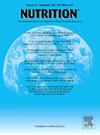不适当的饮食和卫生状况通过引起生态失调影响糖尿病肾病的进展。
IF 3.2
3区 医学
Q2 NUTRITION & DIETETICS
引用次数: 0
摘要
目的:虽然不健康饮食对糖尿病及其肾脏并发症的影响已被充分了解,但卫生状况的影响尚未完全阐明。研究方法和步骤:根据小鼠的日粮(标准[SD]或高脂[HFD])和生活环境(常规[CV]或无特定病原体[SPF]),建立四组小鼠,并对其肾脏病理程度、肠道微生物群和粪便短链脂肪酸(SCFA)浓度进行表征。结果:HFD组和CV组的体重和糖化血红蛋白水平均显著高于SD组和SPF组。HFD和CV组肾脏炎症和纤维化标志物mRNA表达及CD31蛋白水平分别高于SD和SPF组。虽然HFD和CV组的α多样性和总SCFA浓度分别显著低于SD和SPF组,但肠道中炎症、先天免疫、紧密连接和葡萄糖转运蛋白相关基因的mRNA表达仅受HFD的影响。结论:肠道微生物失调,由于不适当的饮食和过度卫生的共同作用,伴随着下肠SCFA的产生,可能通过诱导炎症和纤维化,促进糖尿病和糖尿病肾病的发生和/或进展。本文章由计算机程序翻译,如有差异,请以英文原文为准。
Inappropriate diet and hygiene status affect the progression of diabetic kidney disease by causing dysbiosis
Objective
Although the effects of an unhealthy diet on the risks of diabetes and its renal complications are well understood, the effects of hygiene status have not been fully elucidated.
Research methods and procedures
We created four groups of mice according to the diet fed (standard [SD] or high-fat [HFD]) and their living environment (conventional [CV] or specific pathogen-free [SPF]), and characterized the extent of their kidney pathology, their gut microbiota, and their fecal short-chain fatty acid (SCFA) concentrations.
Results
The body masses and glycated hemoglobin levels of the HFD and CV groups were significantly higher than those of the SD and SPF groups, respectively. The renal mRNA expression of markers of inflammation and fibrosis and the protein level of CD31 were higher in the HFD and CV groups than in the SD and SPF groups, respectively. Although the alpha diversities and total SCFA concentrations of the HFD and CV groups were significantly lower than those of the SD and SPF groups, respectively, the mRNA expression of genes involved in inflammation, innate immunity, tight junctions, and glucose transporters in the gut was only affected by HFD.
Conclusions
Gut microbial dysbiosis, owing to the combined effects of inappropriate diet and excessive hygiene, accompanied by lower intestinal SCFA production, may contribute to the development and/or progression of diabetes and diabetic kidney disease through the induction of inflammation and fibrosis.
求助全文
通过发布文献求助,成功后即可免费获取论文全文。
去求助
来源期刊

Nutrition
医学-营养学
CiteScore
7.80
自引率
2.30%
发文量
300
审稿时长
60 days
期刊介绍:
Nutrition has an open access mirror journal Nutrition: X, sharing the same aims and scope, editorial team, submission system and rigorous peer review.
Founded by Michael M. Meguid in the early 1980''s, Nutrition presents advances in nutrition research and science, informs its readers on new and advancing technologies and data in clinical nutrition practice, encourages the application of outcomes research and meta-analyses to problems in patient-related nutrition; and seeks to help clarify and set the research, policy and practice agenda for nutrition science to enhance human well-being in the years ahead.
 求助内容:
求助内容: 应助结果提醒方式:
应助结果提醒方式:


